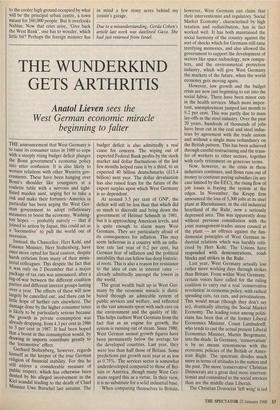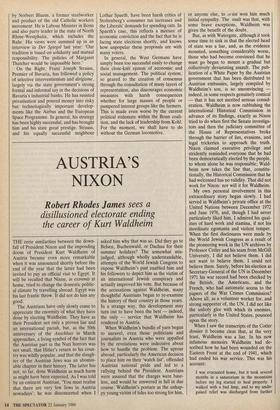THE WUNDERKIND GETS ARTHRITIS
Anatol Lieven sees the West German economic miracle beginning to falter
THE announcement that West Germany is to raise its consumer taxes in 1989 to cope with a steeply rising budget deficit plunges the Bonn government's economic policy into utter confusion. It is also likely to worsen relations with other Western gov- ernments. These have been hanging over Bonn's shoulder like youngsters at a roulette table with a nervous and tight- fisted maiden aunt, urging her to take a risk and make their fortunes., America in particular has been urging the West Ger- man government to adopt reflationary measures to boost the economy. Washing- ton hopes — probably naively — that if joined to action by Japan, this could act as a 'locomotive' to pull the world out of recession.
Instead, the Chancellor, Herr Kohl, and Finance Minister, Herr Stoltenberg, have once more opted for fiscal caution, despite harsh criticism from many of their minis- terial colleagues. This despite the fact that it was only on 2 December that a major package of tax cuts was announced, after a tug-of-war between the different coalition parties and different interest groups lasting over a year. The effects of these will now largely be cancelled out, and there can be little hope of further cuts elsewhere. The damage done by the higher consumer taxes is likely to be particularly serious because the growth in private consumption was already dropping, from 4.3 per cent in 1986 to 3 per cent in 1987. It had been hoped that a boost in this consumption would, by drawing in imports contribute greatly to the 'locomotive' effect.
Gerhard Stoltenberg, however, regards himself as the keeper of the true German religion of financial stability. For this he still enjoys a considerable measure of public respect, which has otherwise been dented by his alleged involvement in the Kiel scandal leading to the death of Chief Minister Uwe Barschel last autumn. The budget deficit is also admittedly a real cause for concern. The wiping out of expected Federal Bank profits by the stock market and dollar fluctuations of the last few months helped raise it by a third, to an expected 40 billion deutschmarks (£13.4 billion) next year. The dollar devaluation has also raised fears for the future of the export surplus upon which West Germany is so dependent.
At around 3.5 per cent of GNP, the deficit will still be less than that which did so much to discredit and bring down the government of Helmut Schmidt in 1981, but it is approaching American levels, and is quite enough to alarm many West Germans. They are particularly afraid of its consequences for inflation. This may seem ludicrous in a country with an infla- tion rate last year of 0.2 per cent, but German fear of inflation and the political instability that can follow has deep historic- al roots. This is also a reason for resistance to the idea of cuts in interest rates already admittedly amongst the lowest in the world.
The great wealth built up in West Ger- many by the economic miracle is distri- buted through an admirable system of public services and welfare, and reflected in the vast amounts spent with such care on the environment and the quality of life. This helps cushion West Germans from the fact that as an engine for growth, the system is running out of steam. Since 1980, West German annual growth figures have been permanently below the average for the developed countries. Last year, they were less than half those of Britain. Some predictions put growth next year at as low as 0.75%. The services sector is somewhat underdeveloped compared to those of Bri- tain or America, though many West Ger- mans regard this as a virtue. In their view, it is no substitute for a solid industrial base. When comparing themselves to Britain, however, West Germans can claim that their interventionist and regulatory 'Social Market Economy', characterised by high taxation and redistribution, has in fact worked well. It has both maintained the social harmony of the country against the sort of shocks which for Germans still raise terrifying memories, and also allowed the government to support the development of sectors like space technology, new compu- ters, and the environmental protection industry, which will give West Germany the markets of the future, when the world economy gets moving again.
However, low growth and the budget crisis are now just beginning to eat into the social fabric. There have been minor cuts in the health services. Much more impor- tant, unemployment jumped last month to 9.2 per cent. This was partly due to mass lay-offs in the steel industry. Over the past 20 years, hundreds of thousands of jobs have been cut in the coal and steel indus- tries by agreement with the trade unions and without a single mass redundancy on the British pattern. This has been achieved through careful restructuring and the trans- fer of workers to other sectors, together with early retirement on generous terms.
Now, however, as the crisis in these industries continues, and Bonn runs out of money to continue paying subsidies (in any case limited by the EEC), the rising flow of job losses is fraying the system at the edges. In November, the Krupp firm announced the loss of 5,300 jobs at its steel plant at Rheinhausen, in the old industrial heartland of the Ruhr, now a seriously depressed area. This was apparently done without previous consultation with the joint management-trades union council at the plant — an offence against the fun- damental principles of West German in- dustrial relations which was harshly criti- cised by Herr Kohl. The Unions have responded with demonstrations, road- blocks and strikes in the Ruhr.
Last year, West Germany actually lost rather more working days .through strikes than Britain. From within West Germany, certain voices have called for the ruling coalition to carry out a real 'conservative revolution' in economic policy, with radical spending cuts, tax cuts, and privatisations. This would mean (though they don't say so), drastically altering the Social Market Economy. The leading voice among politi- cians has been that of the former Liberal Economics Minister, Count Lambsdorff, who tends to cast the actual present Liberal Economics Minister, Martin Bergemann, into the shade. In Germany, 'conservatism' is by no means synonymous with the economic policies of the British or Amer- ican Right. The spectrum divides much more in terms of attitudes to the nation and the past. The more 'conservative' Christian Democrats are a great deal more interven- tionist and committed to the social services than are the middle class Liberals.
The Christian Democrat 'left wing' is led by Norbert Bluem, a former steelworker and product of the old Catholic workers movement. He is Labour Minister in Bonn and also party leader in the state of North Rhine-Westphalia, which includes the Ruhr. His views were summed up in an interview in Der Spiegel last year: 'Our tradition is based on solidarity and mutual responsibility. The policies of Margaret Thatcher would be impossible here.'
On the Right, Franz Joseph Strauss, Premier of Bavaria, has followed a policy of selective interventionism and dirigisme, largely via the state government's strong formal and informal say in the decisions of Bavaria's industrial banks. He has resisted privatisation and poured money into risky but technologically important develop- ments like the Airbus and the European Space Programme. In general, his strategy has been highly successful, and has brought him and his state great prestige. Strauss, and his equally successful neighbour Lothar Spaeth, have been harsh critics of Stoltenberg's consumer tax increases and the Liberals' demands for spending cuts. In Spaeth's case, this reflects a mixture of economic conviction and the fact that he is facing state elections shortly, and knows how unpopular these proposals are with many voters.
In general, the West Germans have simply been too successful easily to change their close-knit system of economic and social management. The political system, so geared to the creation of consensus through the consultation of many layers of representation, also discourages economic measures with harsh consequences whether for large masses of people or pampered interest groups like the farmers. This is made even worse by the current political stalemate within the Bonn coali- tion, and the lack of leadership from Kohl. For the moment, we shall have to do without the German locomotive.



























































 Previous page
Previous page